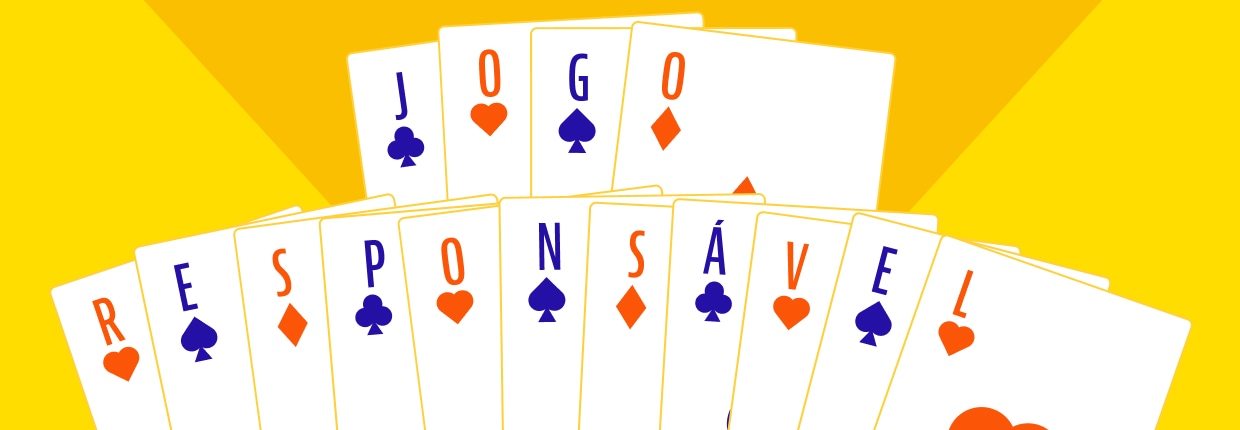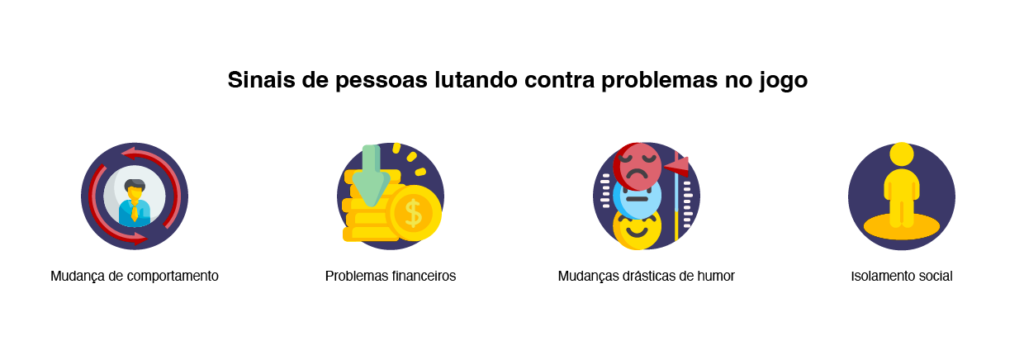Responsible gambling is to be aware of the dangers of gambling and take steps to prevent and monitor your gambling behavior to ensure that it does not become an addictive or harmful practice.

Lot pleasures in life can become an addiction : beverages, tobacco, foods, consumption of goods & the list is infinite. Gambling can also be addictive, with the ease of access to Internet games, online gambling becomes an even more worrying problem. Learn how to identify exaggerated behavior and how to seek help.
Discover the signs of problem gambling
Check out some warning signs of gaming addiction below:
- Playing beyond your financial means
- Not being able to pay bills due to gambling losses
- Staying home after work to play at online casinos
- Feeling frustrated on days when you're not playing
- Constant need to increase the amount of money used to play to achieve levels of satisfaction and enthusiasm
- Always chasing losses, trying to recover as quickly as possible the money that was lost
- Play to escape everyday stress
- Failed attempts to stop gambling in the past
- Feeling angry or frustrated when reducing the budget in gambling
- Trying to recoup lost money by increasing the size or frequency of bets
- Lying about the amount of money or time that is spent on the game
- Hide the game from close people
- Being careless about the well-being of family and friends
- Putting the game above family, friends or other interests
- Lying, borrowing, stealing or committing fraud to get money to gamble
- Reluctant to spend Play Money on anything else
- When gambling ruins a personal relationship or an occupational or educational opportunity
- When arguments, frustrations or disappointments create the need to play more
- Depressive or even suicidal feelings during or after the game
What is problem gambling?
“ Problem gambling problem gambling is defined as gambling-related behavior that causes harm to the player and those around them . This may include family, friends, and others who know or care about the player. "(UK Gambling Commission*). This is a very broad quote. The damage can be of any kind; physical, mental, financial. The behaviors associated with problem gambling and harmful outcomes can be multifaceted and complicated in many cases. They are also not limited to the player alone.

For further clarification, check out some examples of problems with gambling :
- Paul spends the rent money on gambling, he is hurting himself as he bets with money he cannot afford to lose, potentially making his and his family's housing situation precarious. The loss of rent money and debts can also cause financial and mental damage. Paulo is classified as a problem gambler and needs to contact external support services for immediate assistance.
- Jessica likes to gamble, usually plays when she is sober and follows her predetermined limits. However, from time to time, she plays when she drinks alcohol and in this case, she finds it difficult to stop. She plays beyond the budget, but is still within the amount she can bet (she does not spend money that is set aside for food or rent). However, Jessica is at high risk, as she plays after drinking, and can go over her budget, making it difficult to stop gambling. Although this behavior is not frequent, she is at risk of falling apart. Jessica should set deposit and playing time limits at casinos and do a self-assessment regularly. She should stop gambling after drinking and can also benefit from using online help services.
You should always be able to maintain control in the games and only bet what you can afford, and never chase losses or gamble when you are emotionally shaken . (BeGambleAware).
*United Kingdom Gambling Commission ( UKGC).
What steps should be taken when there are problems with gambling
More recently, problem gambling has become a hot topic in the UK, receiving much attention from the media, the UK Gambling Commission (UKGC), major research bodies and NGOs. If you don't know what responsible gambling is, the responsible gambling measures you can access to monitor and limit your gambling behaviors, and where you can get support, check out the information below:
- Be honest, communicate that you need help
- Use the responsible gaming tools provided to prevent yourself from gambling excessively
- Talk to someone you can trust
- Contact support lines
- Look for solutions, don't get stuck in the past
- Establish payment plans in case of debt
- In extreme cases, use the self-exclusion tool (GamSTOP)
- Accept that addiction is part of being human and you are not to blame
Tools used by online casinos to prevent problems with gambling
O vicious gambling is a serious mental health problem , but it is an obstacle that can be overcome if the individual receives professional help and support from loved ones. One of the biggest problems with managing problem gambling is awareness . Problem gambling exists, but the effort to promote responsible gambling tools still needs to be more efficient, and there are still a large number of players who do not know or use responsible gambling measures provided by casinos.
The accounts registered in trusted online casino , (those with appropriate licenses that comply with all regulations for safe gaming) they provide a range of tools to track, manage and ensure your gambling behaviour is healthy, as well as a support team trained to deal with gambling addiction issues . While some tools can be activated online, others require you to contact and speak to the casino directly to make them active. Check out some below:
- Limits on deposits, losses and time in games
- Self-exclusion
- Casino activity history
- Notifications about the period and money spent in the game in real time (pop-ups)
- Freezing of activity for a certain period
Self-assessment test / I suspect I am addicted to gambling
There are a variety of self-tests, questionnaires that you can freely take to check your gaming habit and see if you are at risk of having problems with gambling . Check out the Gamblers Anonymous institution's self-assessment and rate your score based on your answers. You should take a Responsible Gambling self-assessment regularly to check your gambling habits. Check your status, take the test now !
- Score 0 for each time you answer never
- Score 1 for each time you answer sometimes
- Score 2 for each time you answer most of the time
- Mark 3 for each time you answer almost always
- If your total score is 8 or more, you may be a problem gambler .
Block gaming sites and seek help
There are also external tools, in addition to those offered by casinos, to block gambling sites such as BetBlocker and GamBan.
If your test score is higher than 8, don't waste time, seek help. In New Zealand, the best known gambling addiction support institutions are Gamblers Anonymous and turning the tables, both of which offer free support service to people addicted to gambling.
What to do with minors addicted to gambling?
Unfortunately, despite all gambling being illegal for those under 18, Problem Gambling still affects young people. Check out the service from NetNanny, the industry leader in parental control software.
How to prevent gaming addiction
- Do not use gambling as a means of income
- Games are recreational pastimes, nothing more
- Never gamble to escape trouble
- Do not try to recover losses
- Play only when sober
- Know the dangers of gaming addiction
- Be aware of your medical history, previous addictions, and mental health problems
How many people in New Zealand struggle with gambling addiction?
According to a survey conducted in 2017 by the Department of Psychiatry of the University of São Paulo (USP), New Zealand has more than 2 million gambling addicts (1% of New Zealand population) . Did you know? More men than women play , and the amount of problem or at-risk male gamblers is much higher than female, but in both sexes, those aged 24-36 are more vulnerable to problem gambling (UK Gambling Commission).
How do casinos protect players?
The UK Gambling Commission, which is responsible for all research, legislation and regulation for this market, was established in 2005 (although much legislation has existed before, there was no specialist government body responsible).
The UKGC sets out the main responsibilities of the casino for players, which include but are not limited to :
- Transparency and fairness in games and results
- Data protection and Privacy
- Protection of funds
- Operator liability
- And protection from damage
- Again, protection against harm is a very broad category, and this is where responsible gambling belongs with the UKGC, stipulating what tools, measures, support and information casinos must provide about problem gambling.
This is set out in guidelines, called licensing conditions and codes of practice (LCCPs), which all UKGC licensed casinos are required to comply and audited along with other criteria . Therefore, they are the casinos are responsible for most of the player protection since they are the ones offering the service and are held responsible for violating the LCCPs.
The LCCP is a living document and allows the UKGC to update and change the conditions and code as and when they see fit, meaning they can act quickly with market changes and penalise casinos that fail to inform or protect their players.
Recently, there have been some key examples of this:
In 2018, The Gambling Commission and the Advertising Standards Authority teamed up to review the conditions under which casinos can advertise their products. They have updated the marketing area of LCCPS to address and deal with misleading terms, how ads are placed, what they may contain, the types of messages they send & that is, they should not promote gambling irresponsibly and more.
However, gambling is still a problem for many players, and in fact, many are not aware of the tools available in the casino to help monitor and limit gambling behaviors .
There has also been a greater focus on the relationship between Problem Gambling and mental health . Using data from the Adult Psychiatric Morbidity Survey (2007), the UKGC found that 5% of problem gamblers had attempted suicide in the previous year and that 5% of people who had attempted suicide in the previous year were problem gamblers.preventDefault (); window.location.href=' / go/'; 8221;.
Play it safe and know when to stop
Responsible gambling is about knowing when to stop and controlling how you play. Each player who plays should use the responsible gaming tools provided by casinos to monitor how they play and be aware of the risk they expose themselves to. You can find some important tips for keeping track of your betting behavior here and remember, when the Fun Stops, Stop!